#Tech & Science
Text
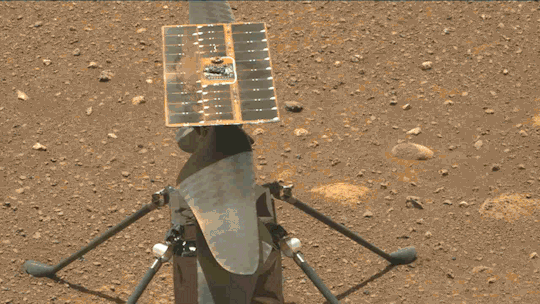
What We Learned from Flying a Helicopter on Mars
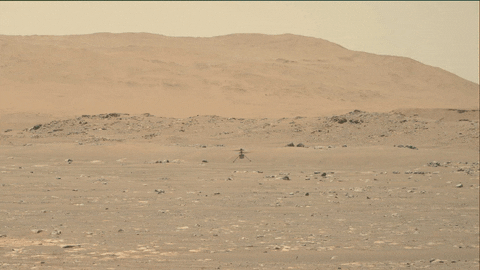
The Ingenuity Mars Helicopter made history – not only as the first aircraft to perform powered, controlled flight on another world – but also for exceeding expectations, pushing the limits, and setting the stage for future NASA aerial exploration of other worlds.
Built as a technology demonstration designed to perform up to five experimental test flights over 30 days, Ingenuity performed flight operations from the Martian surface for almost three years. The helicopter ended its mission on Jan. 25, 2024, after sustaining damage to its rotor blades during its 72nd flight.
So, what did we learn from this small but mighty helicopter?
We can fly rotorcraft in the thin atmosphere of other planets.
Ingenuity proved that powered, controlled flight is possible on other worlds when it took to the Martian skies for the first time on April 19, 2021.
Flying on planets like Mars is no easy feat: The Red Planet has a significantly lower gravity – one-third that of Earth’s – and an extremely thin atmosphere, with only 1% the pressure at the surface compared to our planet. This means there are relatively few air molecules with which Ingenuity’s two 4-foot-wide (1.2-meter-wide) rotor blades can interact to achieve flight.
Ingenuity performed several flights dedicated to understanding key aerodynamic effects and how they interact with the structure and control system of the helicopter, providing us with a treasure-trove of data on how aircraft fly in the Martian atmosphere.
Now, we can use this knowledge to directly improve performance and reduce risk on future planetary aerial vehicles.

Creative solutions and “ingenuity” kept the helicopter flying longer than expected.
Over an extended mission that lasted for almost 1,000 Martian days (more than 33 times longer than originally planned), Ingenuity was upgraded with the ability to autonomously choose landing sites in treacherous terrain, dealt with a dead sensor, dusted itself off after dust storms, operated from 48 different airfields, performed three emergency landings, and survived a frigid Martian winter.
Fun fact: To keep costs low, the helicopter contained many off-the-shelf-commercial parts from the smartphone industry - parts that had never been tested in deep space. Those parts also surpassed expectations, proving durable throughout Ingenuity’s extended mission, and can inform future budget-conscious hardware solutions.

There is value in adding an aerial dimension to interplanetary surface missions.
Ingenuity traveled to Mars on the belly of the Perseverance rover, which served as the communications relay for Ingenuity and, therefore, was its constant companion. The helicopter also proved itself a helpful scout to the rover.
After its initial five flights in 2021, Ingenuity transitioned to an “operations demonstration,” serving as Perseverance’s eyes in the sky as it scouted science targets, potential rover routes, and inaccessible features, while also capturing stereo images for digital elevation maps.
Airborne assets like Ingenuity unlock a new dimension of exploration on Mars that we did not yet have – providing more pixels per meter of resolution for imaging than an orbiter and exploring locations a rover cannot reach.
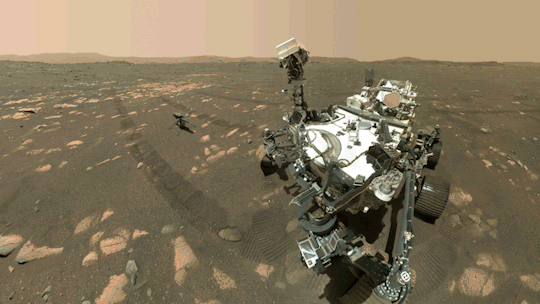
Tech demos can pay off big time.
Ingenuity was flown as a technology demonstration payload on the Mars 2020 mission, and was a high risk, high reward, low-cost endeavor that paid off big. The data collected by the helicopter will be analyzed for years to come and will benefit future Mars and other planetary missions.
Just as the Sojourner rover led to the MER-class (Spirit and Opportunity) rovers, and the MSL-class (Curiosity and Perseverance) rovers, the team believes Ingenuity’s success will lead to future fleets of aircraft at Mars.
In general, NASA’s Technology Demonstration Missions test and advance new technologies, and then transition those capabilities to NASA missions, industry, and other government agencies. Chosen technologies are thoroughly ground- and flight-tested in relevant operating environments — reducing risks to future flight missions, gaining operational heritage and continuing NASA’s long history as a technological leader.
youtube
You can fall in love with robots on another planet.
Following in the tracks of beloved Martian rovers, the Ingenuity Mars Helicopter built up a worldwide fanbase. The Ingenuity team and public awaited every single flight with anticipation, awe, humor, and hope.
Check out #ThanksIngenuity on social media to see what’s been said about the helicopter’s accomplishments.
youtube
Learn more about Ingenuity’s accomplishments here. And make sure to follow us on Tumblr for your regular dose of space!
4K notes
·
View notes
Text

Alright people. I need your help. Enrollment for Skype a scientist this semester has been -fine- but we can do better. We have so many scientists who want to speak with classrooms! Will you tell a teacher you know about our program 🥺 please?
Send them to skypeascientist.com/sign-up
2K notes
·
View notes
Text
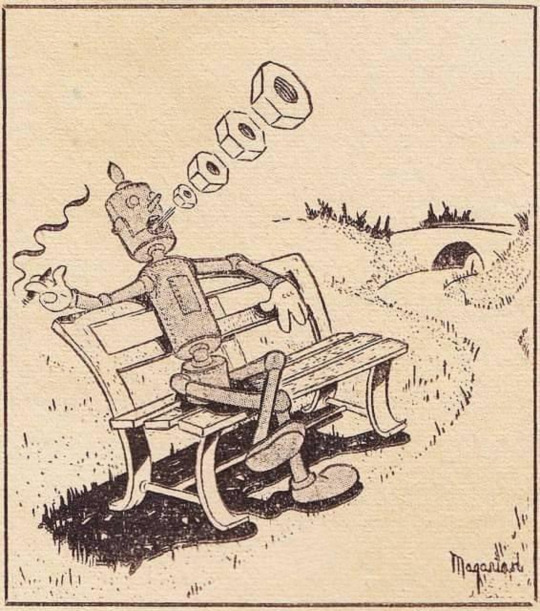
Albert Magarian cartoon for Amazing Stories, December 1941.
3K notes
·
View notes
Text
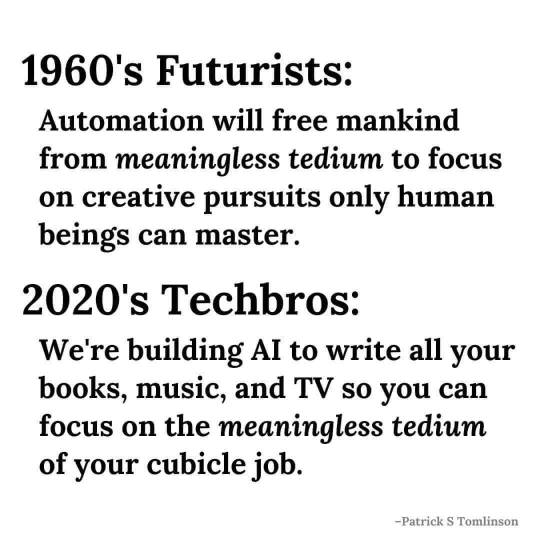
3K notes
·
View notes
Text
I made a beginner coding resource! 👩🏾💻💗


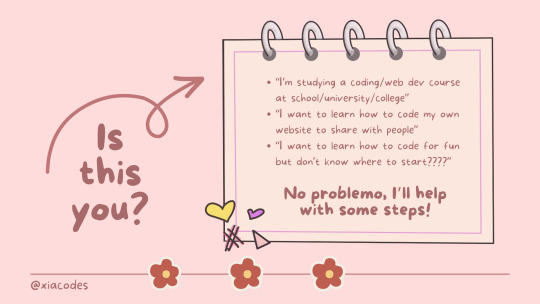
Hiya! 👩🏾💻💗
I made a coding infographic/slideshow for anyone getting into coding and are stuck! I'm seeing a lot of new codeblr blogs coming up recently and they're all beginners and I have been getting a lot of asks which basically all ask "I'm new to coding, how do I start?", so I decided to make this at 1am in the morning real quick! 🥲😭
I genuinely hope that this resource proves beneficial to someone out there. And remember, if you find yourself still facing challenges or need assistance with anything else, please don't hesitate to reach out. I'm here to help! ✨
Link to the PDF: LINK
#resources#my resources#codeblr#coding#progblr#programming#studyblr#studying#computer science#tech#study tips#compsci#studyblr community#cs studyblr#cs student#study aesthetic#pink study
2K notes
·
View notes
Text

Hyperspace Commodore
#art#nostalgia#1980s#vaporwave#aesthetic#vintage#magazine#neon colors#1990s#neon#retro computing#computer science#computers#computer#retro tech#tech#technology#retrowave#retro#80s style#80s aesthetic#80s#pc#hardware#software#commodore#retro aesthetic#illustration#90s aesthetic#90s
580 notes
·
View notes
Text






Nintendo controllers under an X-ray machine
#nintendo#switch#wii#gamecube#n64#snes#super nintendo#nes#xray#science#geek#gaming#tech#video games#nintendo switch#pokemon#mario#zelda#animal crossing#metroid#nintendo 64#90s#retro#nostalgia#retrogaming
2K notes
·
View notes
Text
Kickstarting “The Bezzle” audiobook, sequel to Red Team Blues

I'm heading to Berlin! On January 29, I'll be delivering Transmediale's Marshall McLuhan Lecture, and on January 30, I'll be at Otherland Books (tickets are limited! They'll have exclusive early access to the English edition of The Bezzle and the German edition of Red Team Blues!).

I'm kickstarting the audiobook for The Bezzle, the sequel to last year's Red Team Blues, featuring Marty Hench, a hard-charging, two-fisted forensic accountant who spent 40 years in Silicon Valley, busting every finance scam hatched by tech bros' feverish imaginations:
http://thebezzle.org
Marty Hench is a great character to write. His career in high-tech scambusting starts in the early 1980s with the first PCs and stretches all the way to the cryptocurrency era, the most target-rich environment for scamhunting tech has ever seen. Hench is the Zelig of tech scams, and I'm having so much fun using him to probe the seamy underbelly of the tech economy.
Enter The Bezzle, which will be published by Tor Books and Head of Zeus on Feb 20: this adventure finds Marty in the company of Scott Warms, one of the many bright technologists whose great startup was bought and destroyed by Yahoo! (yes, they really used that asinine exclamation mark). Scott is shackled to the Punctuation Factory by golden handcuffs, and he's determined to get fired without cause, so he can collect his shares and move onto the next thing.
That's how Scott and Marty find themselves on Catalina island, the redoubt of the Wrigley family, where bison roam the hills, yachts bob in the habor and fast food is banned. Scott invites Marty on a series of luxury vacations on Catalina, which end abruptly when they discover – and implode – a hamburger-related Ponzi scheme run by a real-estate millionaire who is destroying the personal finances of the Island's working-class townies out of sheer sadism.
Scott's victory is bittersweet: sure, he blew up the Ponzi scheme, but he's also made powerful enemies – the kinds of enemies who can pull strings with the notoriously corrupt LA County Sheriff's Deputies who are the only law on Catalina, and after taking a pair of felony plea deals, Scott gets the message and never visits Catalina Island again.
That could have been the end of it, but California's three-strikes law – since rescinded – means that when Scott picks up one more felony conviction for some drugs discovered during a traffic stop, he's facing life in prison.
That's where The Bezzle really gets into gear.
At its core, The Bezzle is a novel about the "shitty technology adoption curve": the idea that our worst technological schemes are sanded smooth on the bodies of prisoners, mental patients, kids and refugees before they work their way up the privilege gradient and are inflicted on all of us:
https://pluralistic.net/2023/04/12/algorithmic-wage-discrimination/#fishers-of-men
America's prisons are vicious, brutal places, and technology has only made them worse. When Scott's prison swaps out in-person visits, the prison library, and phone calls for a "free" tablet that offers all these services as janky apps that cost ten times more than they would on the outside, the cruelty finds a business model.
Working inside and outside the prison Marty Hench and Scott Warms figure out the full nature of the scam that the captive audience of prisoners are involuntary beta-testers for, and they discover a sprawling web of real-estate fraud, tech scams, and offshore finance that is extracting fortunes from the hides of America's prisoners and their families. The criminals who run that kind of enterprise aren't shy about fighting for what they've got, and they're more than happy to cut some of LA County's notorious deputy gangs in for a cut in exchange for providing some kinetic support for the project.
The Bezzle is exactly the kind of book I was hoping I'd get to write when I kicked off the Hench series – one that decodes the scam economy, from music royalties to prison videoconferencing, real estate investment trusts to Big Four accounting firm bogus audits. It's both a fast-moving, two-fisted crime novel and a masterclass on how the rich and powerful get away with both literal and figurative murder.
It's getting a big push from both my publishers and I'll be touring western Canada and the US with it. The early reviews are spectacular. But despite all of this, I had to make my own audiobook for it, which I'm pre-selling on Kickstarter:
http://thebezzle.org
Why? Because Audible – Amazon's monopoly gatekeeper to the audiobook world, with more than 90% of the market – refuses to carry my work.
Audible uses Digital Rights Management to lock every audiobook they sell to their platform. Legally, only an Audible-authorized app can decrypt and play the audiobooks they sell you. Distributing a tool that removes Audible DRM is a felony under Section 1201 of the 1998 DMCA.
That means that if you break up with Audible – delete your Audible apps – you will lose your entire audiobook library. And the fact that you're Audible's hostage makes the writers you love into their hostages, too. Writers understand that if they leave the Audible platform, their audience will have to choose between following them, or losing all their audiobooks.
That's how Audible gets away with abusing its performers and writers, up to and including the $100m Audiblegate wage-theft scandal:
https://www.audiblegate.com/
Audible can steal $100m from its writers…and the writers still continue to sell on the platform, because leaving will cost them their audience.
This is canonical enshittification: lock in users, then screw suppliers. Lots of companies abuse DRM to do this, but none can hold a candle to Amazon, who understand that the DMCA is a copyright law that protects corporations at the expense of creators.
Under DMCA 1201 commercial distribution of a "circumvention device" carries a five-year prison sentence and a $500,000 fine. That means that if I write a book, pay to have it recorded, and then sell it to you through Audible, I am criminally prohibited from giving you the tool to take it from Audible to another platform. Even though I hold the copyright to that work, I would face a harsher sentence than you would if you simply pirated the audiobook from some darknet site. Not only that: if you shoplifted the audiobook in CD form, you'd get a lighter sentence than I, the copyright holder, would receive for giving you a tool to unlock it from Amazon's platform! Hell, if you hijacked the truck that delivered the CD, you'd get off lighter than I would. This is a scam straight out of a Marty Hench novel.
This is batshit. I won't allow it. My books are licensed on the condition that they must not be sold with DRM. Which means that Audible won't sell my books, which means that my publishers are thoroughly disinterested in paying thousands of dollars to produce audiobooks of my titles. A book that isn't sold in the one store than accounts for 90% of all sales is unlikely to do well.
That's where you come in. Since 2020, I've used Kickstarter to pre-sell five of my audiobooks (I wrote nine books during lockdown!). All told, I've raised over $750,000 (gross! but still!) on these crowdfunders. More than 20,000 backers have pitched in! The last two of these books – The Internet Con and The Lost Cause – were national bestsellers.
This isn't just a way for me to pay off a lot of bills and put away something for retirement – it's proof that readers care about supporting writers and don't want to be locked in by a giant monopolist that depends on its drivers pissing in bottles to make quota.
It's a powerful message about the desire for something better than Amazon. It's part of the current that is driving the FTC to haul Amazon into court for being a monopolist, and also part of the inspiration for other authors to try treating Amazon as damage and routing around it, with spectacular results:
https://www.kickstarter.com/projects/dragonsteel/surprise-four-secret-novels-by-brandon-sanderson
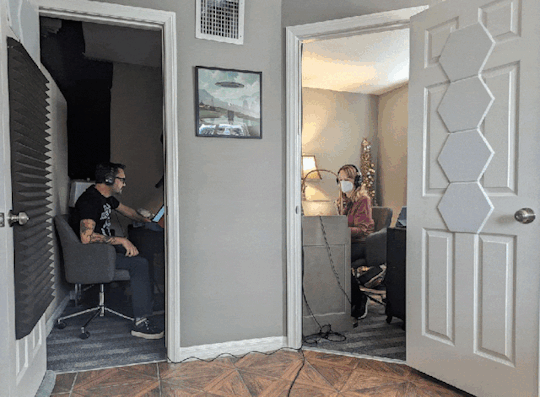
And I'm doing it again. Last December, I went into Skyboat Media's studios where Gabrielle De Cuir directed @wilwheaton, who reprised his role as Marty Hench for the audiobook of The Bezzle. It came out amazing:
https://archive.org/details/bezzle-sample
Now I'm pre-selling this audiobook, as well as the ebook and hardcover for The Bezzle. I'm also offering bundles with the ebook and audiobook for Red Team Blues (naturally these are all DRM-free). You can get your books signed and personalized and shipped anywhere in the world, courtesy of Book Soup, and I've partnered with Libro.fm to deliver DRM-free audiobooks with an app for people who don't want to mess around with sideloading.
I've also got some spendy options for high rollers. There's three chances to name a character in the next Hench novel (Picks and Shovels, Feb 2025). There's also five chances to commission a Hench short story about your favorite tech scam, and get credited when the story is published.
The Kickstarter runs for the next three weeks, which should give me time to get the hardcopy books signed and shipped to arrive around the on-sale date. What's more, I've finally worked out all the post-Brexit kinks with shipping my UK publisher's books to EU backers. I'm working with Otherland Books to fulfill those EU orders, and it looks like I'm going to be able to sign a giant stack of those when I'm in Berlin later this month to give the annual Marshall McLuhan lecture at the Canadian embassy:
https://transmediale.de/en/2024/event/mcluhan-2024
Red Team Blues and its sequels are some of the most fun – and informative – work I've done in my quarter-century career. I love how they blend technical explanations of the scam economy with high-intensity technothrillers. That's the the same mix as my bestselling YA series Little Brother series – but these are firmly adult novels.
The Bezzle came out great. I hope you'll give it a try – and that you'll come out to see me in late February when I hit the road with the book! Here's that Kickstarter link again:
http://thebezzle.org

If you'd like an essay-formatted version of this post to read or share, here's a link to it on pluralistic.net, my surveillance-free, ad-free, tracker-free blog:
https://pluralistic.net/2024/01/10/the-bezzle/#marty-hench
#pluralistic#kickstarter#audible#the bezzle#bezzles#prison tech#disciplinary technology#crowdfunding#wilw#wil wheaton#audiobooks#publishing#science fiction#marty hench#martin hench#red team blues#shitty technology adoption curve#reits
661 notes
·
View notes
Photo




#cyberpunk#cyberpunk art#cyber#pop art#contemporary art#neotokyo#bladerunner#ghost in the shell#retrofuture#1984#dystopian#high tech low life#scifi#science fiction#gif#animation#1000#2000#5000
7K notes
·
View notes
Text

Does a USB drive get heavier as you store more files on it?
Nope. Paradoxically (and theoretically), the more you save on a flash drive, the lighter it gets.
USB drives use Flash memory, which means the the ones and zeros of the data are stored on transistors.
When you save data, a binary zero is set by charging the float gate of the transistor, and a binary one is set by removing the charge.
To charge it, we add electrons, and the mass of each electron is 0.00000000000000000000000000091 grams.
This means that an empty USB drive (which mostly holds zeros) weighs more than a full USB drive (which has ones and zeros). Add data, reduce the weight.
#usb charger#usb port#usb cable#usb#technews#minimal techno#technoblade#technology#tech magic#tech memes#science and technology#science acumen#scientific illustration#scifi#science#the glass scientists#mad scientist#computer science#computer accessories#mobile application development#mobile app development
967 notes
·
View notes
Text

LaRue Burbank, mathematician and computer, is just one of the many women who were instrumental to NASA missions.
4 Little Known Women Who Made Huge Contributions to NASA
Women have always played a significant role at NASA and its predecessor NACA, although for much of the agency’s history, they received neither the praise nor recognition that their contributions deserved. To celebrate Women’s History Month – and properly highlight some of the little-known women-led accomplishments of NASA’s early history – our archivists gathered the stories of four women whose work was critical to NASA’s success and paved the way for future generations.
LaRue Burbank: One of the Women Who Helped Land a Man on the Moon
LaRue Burbank was a trailblazing mathematician at NASA. Hired in 1954 at Langley Memorial Aeronautical Laboratory (now NASA’s Langley Research Center), she, like many other young women at NACA, the predecessor to NASA, had a bachelor's degree in mathematics. But unlike most, she also had a physics degree. For the next four years, she worked as a "human computer," conducting complex data analyses for engineers using calculators, slide rules, and other instruments. After NASA's founding, she continued this vital work for Project Mercury.
In 1962, she transferred to the newly established Manned Spacecraft Center (now NASA’s Johnson Space Center) in Houston, becoming one of the few female professionals and managers there. Her expertise in electronics engineering led her to develop critical display systems used by flight controllers in Mission Control to monitor spacecraft during missions. Her work on the Apollo missions was vital to achieving President Kennedy's goal of landing a man on the Moon.
Eilene Galloway: How NASA became… NASA

Eilene Galloway wasn't a NASA employee, but she played a huge role in its very creation. In 1957, after the Soviet Union launched Sputnik, Senator Richard Russell Jr. called on Galloway, an expert on the Atomic Energy Act, to write a report on the U.S. response to the space race. Initially, legislators aimed to essentially re-write the Atomic Energy Act to handle the U.S. space goals. However, Galloway argued that the existing military framework wouldn't suffice – a new agency was needed to oversee both military and civilian aspects of space exploration. This included not just defense, but also meteorology, communications, and international cooperation.
Her work on the National Aeronautics and Space Act ensured NASA had the power to accomplish all these goals, without limitations from the Department of Defense or restrictions on international agreements. Galloway is even to thank for the name "National Aeronautics and Space Administration", as initially NASA was to be called “National Aeronautics and Space Agency” which was deemed to not carry enough weight and status for the wide-ranging role that NASA was to fill.
Barbara Scott: The “Star Trek Nerd” Who Led Our Understanding of the Stars

A self-described "Star Trek nerd," Barbara Scott's passion for space wasn't steered toward engineering by her guidance counselor. But that didn't stop her! Fueled by her love of math and computer science, she landed at Goddard Spaceflight Center in 1977. One of the first women working on flight software, Barbara's coding skills became instrumental on missions like the International Ultraviolet Explorer (IUE) and the Thermal Canister Experiment on the Space Shuttle's STS-3. For the final decade of her impressive career, Scott managed the flight software for the iconic Hubble Space Telescope, a testament to her dedication to space exploration.
Dr. Claire Parkinson: An Early Pioneer in Climate Science Whose Work is Still Saving Lives

Dr. Claire Parkinson's love of math blossomed into a passion for climate science. Inspired by the Moon landing, and the fight for civil rights, she pursued a graduate degree in climatology. In 1978, her talents landed her at Goddard, where she continued her research on sea ice modeling. But Parkinson's impact goes beyond theory. She began analyzing satellite data, leading to a groundbreaking discovery: a decline in Arctic sea ice coverage between 1973 and 1987. This critical finding caught the attention of Senator Al Gore, highlighting the urgency of climate change.
Parkinson's leadership extended beyond research. As Project Scientist for the Aqua satellite, she championed making its data freely available. This real-time information has benefitted countless projects, from wildfire management to weather forecasting, even aiding in monitoring the COVID-19 pandemic. Parkinson's dedication to understanding sea ice patterns and the impact of climate change continues to be a valuable resource for our planet.
Make sure to follow us on Tumblr for your regular dose of space!
#NASA#space#tech#technology#womens history month#women in STEM#math#climate science#computer science
2K notes
·
View notes
Text
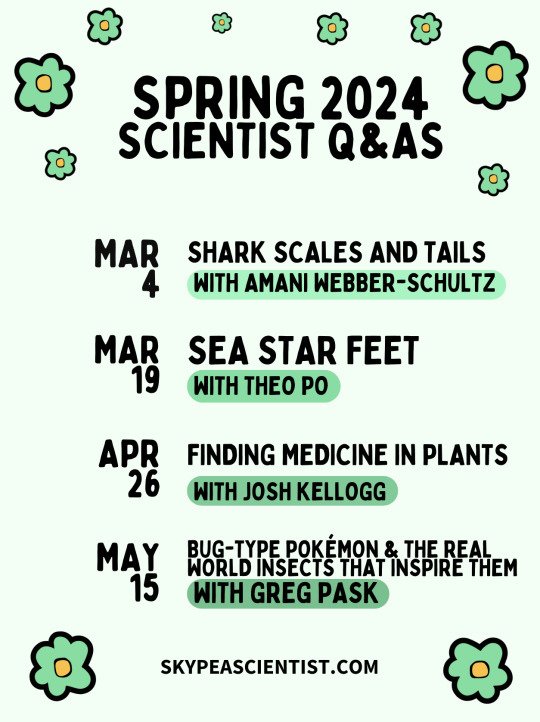
As many of you know, I run a program called Skype a Scientist! We match scientists with classrooms, scout troops, libraries, and more for Q&A sessions about science. We ALSO run monthly livestreams with hand-picked scientists on zoom webinar.
Here are the upcoming sessions. All are welcome to attend, and all sessions are free.
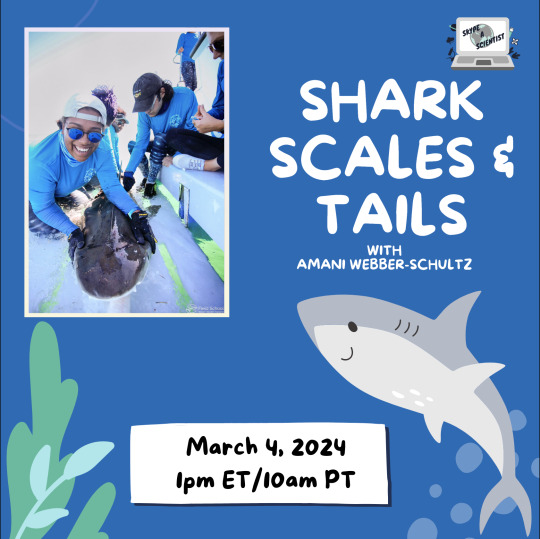
RSVP for Shark Scales and Tails here

RSVP for Sea Star Feet here

RSVP for Finding Medicine in Plants here

RSVP for Pokemon here
Also!!! and critically!!! If you want to get matched with a scientist for YOUR classroom, scout troop, library, etc, we would love love love to match you with one of our scientist volunteers. That's what we're here for. Sign up here.
#Science education#science teacher#sciteach#ed tech#edtech#Please tell a teacher you know#We have very little advertising money#reblog for the kids
522 notes
·
View notes
Text

#gentle reminder#bunny makes blinkies#codeblr#coding#open folder: png#progblr#studyblr#css#programming#code blog#programming blog#programming blr#comp sci#computer science#2000s tech#pink#pink tech#pink aesthetic#old web#old tech#techcore#webcore
1K notes
·
View notes
Text
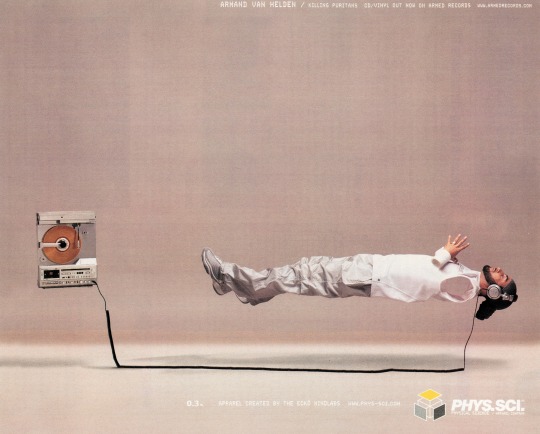
Marc Ecko’s Physical Science Mindlabs apparel ad print in EGM magazine issue n°140 (2001)
#marc ecko#physical science mindlabs#apparel#tech#ad#egm#electronic gaming monthly#magazine#issue#n°140#2001#photography
1K notes
·
View notes
Text
How to learn: HTML | Resources ✨


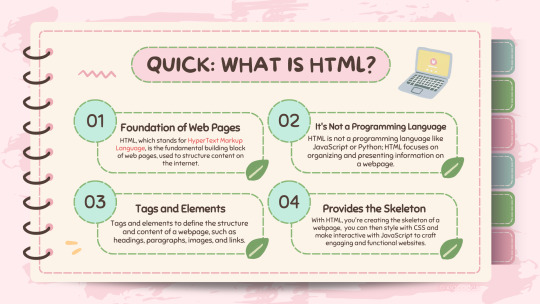
Sunday 10th September 2023
I have come back with a new resource I've made! This time about how to learn HTML! I'm starting from the basics right now and working my way up of 'how to learn' info resources!😅
I've made a HTML resource in the past (one | two) but this one is a bit more detailed and has tips of how I studied HTML. I use HTML on the daily so though I would share my knowledge with more people. Again, just like my previous resource "Starting your coding journey", this is more targeted towards absolute beginners or for people who want to learn how to customise their Tumblr blog/Neocite! 👩🏾💻
Anyhoo, check it out and let me know what you think: LINK
#my resources#resources#codeblr#coding#progblr#programming#studyblr#studying#computer science#tech#neocities#programmer#comp sci#study tips#compsci#studyblr community#cs studyblr#cs student#study aesthetic#pink study
1K notes
·
View notes
Text

Floppy Disc Cords
#art#nostalgia#1980s#vaporwave#aesthetic#vintage#neon colors#1990s#floppy disk#80s style#90s aesthetic#90s#80s aesthetic#80s music#80s#music#guitar#hardware#retro tech#highway#technology#tech#retro computing#computer science#computers#computer#retrowave#retro#illustration#rainbow
454 notes
·
View notes